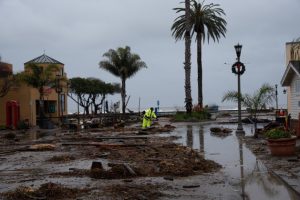Invest in Flooding Research Today To Protect Tomorrow
 16 November 2024
16 November 2024

In the United States, in 2024 alone, there have been 24 climate change associated events with losses exceeding $1 billion each. Credit: Shutterstock.
By Esther Ngumbi
URBANA, Illinois, US, Nov 15 2024 (IPS)
The United Nations recently released the 2024 Nationally Determined Contributions synthesis report, just weeks before presidents, global leaders, climate scientists and activists convene in Azerbaijan for the 2024 United Nations Climate Change Conference. The report reveals that current national climate plans are not sufficient.
This is particularly alarming considering how many countries, including the United States, were negatively and economically impacted by climate change associated disasters this year, including flooding, extreme heat, drought, and pest out breaks.
In the United States, in 2024 alone, according to NOAA, there have been over 24-billion-dollar climate change associated events that have causes losses exceeding $1 billion. Also in the United States, damage by flooding averages $46 billion a year. In Western Africa, flooding disrupted the lives of millions and resulted in overwhelming losses. In the greater Horn of Africa, millions are facing food insecurity and acute hunger due to repeated droughts.
Funding flooding research would help to cut down the devastating impacts flooding has on agricultural crops and the financial burdens that come about after flooding including government and insurance payouts to those that are impacted
Flooding, that ranks in the top three of the disasters, according to NOAA, has particularly hit hard in 2024. It has caused destruction not only of human lives but of livestock, poultry, and agricultural plants. Yet, to date, flooding news has only focused on the impacts flooding has on humans and not plants. Yet the recent flooding events in Spain, for example, have negatively impacted agriculture.
Worse still is the fact that many of these climate-change associated events often happen concurrently, producing catastrophic and compounding effects on livelihoods and economies.
Conversations surrounding COP29 will heavily focus on climate finance and the need to grow the finances being committed for climate change action. While finance can help reduce the impacts these climate disasters have on livelihoods and economies, those investments need to be coupled with investments exclusively dedicated to climate research.
Investing in emerging climate disasters such as flooding today will be crucial and boost climate resilience. Otherwise, in the future, food shortages will become more common and food prices more volatile, with the potential to exacerbate conflict over scarce resources.
Funded flooding research will not only provide foundational answers about the impacts of flooding, but also solutions. These multifaceted solutions range from identifying and breeding flooding tolerant crops, and finding sustainable products that can be applied to help plants and soils to recover well and boost their ability to defend themselves from pests, pathogens and plant viruses following flooding.
Similarly, flooding research could also identify combinations of crops that can be planted together to suppress flooding impacts while finding regenerative agricultural practices that do help to mitigate flooding impacts on plants.
Financial investments in flooding research are necessary. These can come through governments’ national science funding agencies.
In the United States, for example, the National Science Foundation, NOAA, and United States Department of Agriculture are big funders of research. To ensure that these emerging climate change associated stressors, particularly flooding and its impacts on agricultural crops are addressed via research, special proposal calls can be advertised and funds set aside to specifically fund flooding related research.
There are indicators that we are moving in the right direction. Recently, the BIDEN-Harris administration, through NOAA funded over $22.78 M to advance research of water-related climate impacts .
However, though encouraging most of the funded projects are on modelling and improving prediction of flooding.
For example, $7.6 M was awarded to fund work to create street-level maps of potential flood, improve models of how water cycles through nations rivers, all of which will help communities and businesses better understand the effects of extreme rainfall.
None of the projects focused on understanding and predicting the impacts flooding will have on agricultural plants or finding solutions to conquer the negative impacts flooding has on plants, soils and beneficial microbes that underpin plant health and productivity. These are areas that must be funded, too.
Funding flooding research and research surrounding building climate resilience would help ensure that lives are saved, infrastructure-related damage is cut down. Importantly, funding flooding research would help to cut down the devastating impacts flooding has on agricultural crops and the financial burdens that come about after flooding including government and insurance payouts to those that are impacted.
A 2024 climate resiliency report revealed that for every $1 invested in preparing for climate change associated disasters saves communities $13 in damages and economic impacts.
Similarly, according to the United Nations Office for Disaster Risk Reduction, every $1 invested in prevention and preparedness can save up to US$15 in damages and economic costs.
Research has continued to provide sustainable solutions to climate change-associated disasters. Investing in flooding research today will prepare us for tomorrow and a future where flooding events are expected to increase.
Esther Ngumbi, PhD is Assistant Professor, Department of Entomology, African American Studies Department, University of Illinois at Urbana-Champaign
